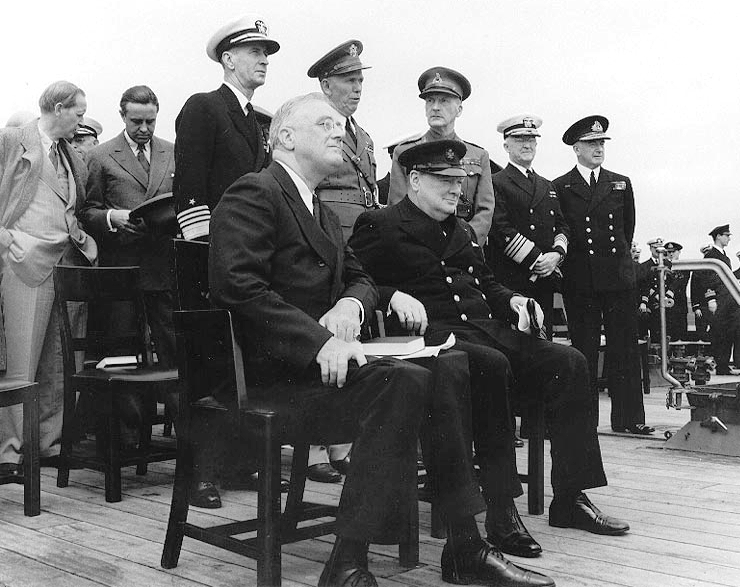75th Anniversary of the Atlantic Conference
by Conrad Black (September 2016)

On June 17, Roosevelt fired his War secretary, Harry Woodring, who had opposed rearming the British after Dunkirk, and in the closest the United States has come to coalition government, named eminent Republicans Henry Stimson and Frank Knox, who had been the Republican vice presidential candidate in 1936, as secretaries of War and of the Navy, just a week before the Republican convention. Roosevelt had still not hinted whether he would seek nomination to a third term. Roosevelt wrote Woodring a letter expressing his determination to stay out of the war on June 17, the same day he wrote Reynaud promising support and inciting the inference that The U.S. could join the war. Roosevelt declined the request of both recipients to make the letters public, and they would have been difficult to reconcile. This was the gap Roosevelt was trying to bridge as the Battle of Britain began and he prepared to break a tradition as old as the republic and seek a third term in what promised to be a fierce reelection campaign.
The Atlantic Charter of human rights could not have been in greater contrast to the notions of government of Germany and its allies, and Goebbels suppressed all public reference to it. It did create certain ambiguities for parts of the British Empire, such as India, as the Canadian Lord Beaverbrook pointed out. The conference also confirmed the hypothesis that had been agreed at the start of the joint staff talks in Washington nine months before: that if the U.S. were drawn into the war, even if through Japanese actions, Germany was the principal enemy and would have to be subdued as a priority. This was especially the case now that Russia, if not an ally, at least shared the common enemy. There was disagreement over the British claim that Germany could be successfully defeated by aerial bombardment, a sea blockade, and assistance to guerrilla resistance movements. Roosevelt and his advisers did not believe a word of it and assumed it was just an attempt to sugar-coat what war with Germany would be like. But General Marshall, whom Roosevelt asked to reply on strictly military matters, passed over this quickly as the U.S. was not a combatant. It would be settled later, when it was no longer an academic point.
In the short term, the most important result of the meeting was the attention paid to the Japanese, a country that the British, preoccupied as they were with Europe and the Mediterranean, had not much considered. Japan imported 85 per cent of its oil from the United States, and Roosevelt, as a policy on its merits, and as a means of approaching the war in a way that would unite American opinion, had embargoed exports to Japan of oil and scrap metal which fed most of the Japanese steel industry, until that country abandoned its invasions of China and Indochina. Roosevelt explained to Churchill that there was not an absolute embargo, merely a review of exports on a case by case basis as each tanker-load required an individual permit. Churchill remonstrated that a complete cut-off should be imposed, so desirous was he of having the U.S. in the war, whatever route got it there.
__________________________________
To comment on this article or to share on social media, please click here.
To help New English Review continue to publish interesting and informative articles such as this, please click here.
If you have enjoyed this article and want to read more from Conrad Black, please click here.
Conrad Black also contributes regularly to our Community Blog, The Iconoclast. Please click here to see all his contributions, on which comments are welcome.
